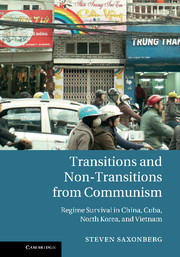Crossref Citations
This Book has been
cited by the following publications. This list is generated based on data provided by Crossref.
Bechtol, Bruce E.
2014.
North Korea and Regional Security in the Kim Jong-un Era.
p.
106.
Kailitz, Steffen
and
Mannewitz, Tom
2015.
Handbuch Vergleichende Politikwissenschaft.
p.
1.
Åberg, Martin
and
Högman, Ann-Kristin
2015.
Histories Meet Histories: A Pilot Study of Migration and Civil Society in Swedish Medium-Sized Cities, Small Towns, and Villages.
Journal of Civil Society,
Vol. 11,
Issue. 2,
p.
187.
Mazepus, Honorata
Veenendaal, Wouter
McCarthy-Jones, Anthea
and
Trak Vásquez, Juan Manuel
2016.
A comparative study of legitimation strategies in hybrid regimes.
Policy Studies,
Vol. 37,
Issue. 4,
p.
350.
Kailitz, Steffen
and
Mannewitz, Tom
2016.
Handbuch Vergleichende Politikwissenschaft.
p.
585.
Wang, Zhengxu
2016.
With the Rise of China, What’s New for Comparative Politics?.
Chinese Political Science Review,
Vol. 1,
Issue. 3,
p.
506.
Wang, Zhengxu
and
Zeng, Jinghan
2016.
Xi Jinping: the game changer of Chinese elite politics?.
Contemporary Politics,
Vol. 22,
Issue. 4,
p.
469.
Bye, Vegard
2016.
The great paradox: how Obama’s opening to Cuba may imperil the country’s reform process.
Third World Quarterly,
Vol. 37,
Issue. 9,
p.
1698.
Bye, Vegard
2017.
Cuba’s Critical Juncture: Main Challenges.
Iberoamericana – Nordic Journal of Latin American and Caribbean Studies,
Vol. 46,
Issue. 1,
p.
109.
Sicurelli, Daniela
2017.
The conditions for effectiveness of EU human rights promotion in non-democratic states. A case study of Vietnam.
Journal of European Integration,
Vol. 39,
Issue. 6,
p.
739.
Stoehrel, Rodrigo Ferrada
2017.
The regime’s worst nightmare: the mobilization of citizen democracy. A study of Podemos’ (aesthetic) populism and the production of affect in political discourse.
Cultural Studies,
Vol. 31,
Issue. 4,
p.
543.
Lee, Hanhee
2018.
Analyzing the political survival prospects of Kim Jong-un's North Korean regime through the framework of selectorate theory.
Japanese Journal of Political Science,
Vol. 19,
Issue. 3,
p.
474.
Saxonberg, Steven
2019.
Pre-Modernity, Totalitarianism and the Non-Banality of Evil.
p.
1.
Wu, Guoguang
2020.
Challenges of Globalization and Prospects for an Inter-civilizational World Order.
p.
241.
Dukalskis, Alexander
and
Gerschewski, Johannes
2020.
Adapting or Freezing? Ideological Reactions of Communist Regimes to a Post-Communist World.
Government and Opposition,
Vol. 55,
Issue. 3,
p.
511.
Goldring, Edward
and
Greitens, Sheena Chestnut
2020.
Rethinking Democratic Diffusion: Bringing Regime Type Back In.
Comparative Political Studies,
Vol. 53,
Issue. 2,
p.
319.
Heurlin, Christopher
2020.
Authoritarian Aid and Regime Durability: Soviet Aid to the Developing World and Donor–Recipient Institutional Complementarity and Capacity.
International Studies Quarterly,
Vol. 64,
Issue. 4,
p.
968.
Stockemer, Daniel
and
Kailitz, Steffen
2020.
Economic development: How does it influence the survival of different types of autocracy?.
International Political Science Review,
Vol. 41,
Issue. 5,
p.
711.
KONG, TAT YAN
2020.
The Advance of Marketization in North Korea: Between political rigidity and economic flexibility.
Modern Asian Studies,
Vol. 54,
Issue. 3,
p.
830.
Bye, Vegard
2020.
Cuba, From Fidel to Raúl and Beyond.
p.
207.





